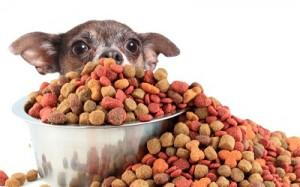How to Evaluate a Pet Food's Quality -- Part I
posted: Jan. 30, 2019.

How to Evaluate a Pet Food's Quality -- Part I
With all of the thousands of pet foods out there it is easy to get overwhelmed when trying to decide what to feed your furry friend. Here are a few things to look for when you head to the store…
IDENTIFY THE REAL MANUFACTURER
- Does the manufacturer make the food in its own facility?
- Does it employ a BOARD-CERTIFIED VETERINARY NUTRITIONIST?
- Does it have an American feed control officials (AFFCO) FEEDING TRIAL STATEMENT?
- Does the company PRACTICE STRICT QUALITY CONTROL MEASURES and CONDUCT & PUBLISH RESEARCH ON ANIMAL NUTRITION (in peer-reviewed journals)?
Interesting examples of the importance of determining a pet food's real manufacturer...
- Until recently, Blue Buffalo was made by five different manufacturers--American Nutrition, C.J. Foods, ProPet, Triple T Foods & Tuffy's Pet Foods.
- The flip side co-packing is MASS MANUFACTURING. For example, Diamond Pet Foods, is the manufacturer behind at least 30 different pet foods, including Chicken Soup for the Pet Lover's Soul, Canidae, Kirkland (Costco's Brand), Solid Gold Wolf King, Taste of the Wild, 4 Health, Professional and Premium Edge, to name a few. Diamond Pet Food's Gaston, South Carolina, plant was also home to a national salmonella enterica outbreak, which led to the largest recall of dry pet foods. More than 30,000 tons of food were recalled after a New Jersey infant became severely ill from contact with Costco's Kirkland brand pet food. In 2012, a sample of Diamond Pet Food's lamb-based food from its Meta, Missouri, plant tested positive for Salmonella liverpool, but no human illness was reported. Why such an ongoing problem? Unfortunately, regulatory agencies don't require manufacturers to test their final pet food products for Salmonella. That's why it's important to ask your favorite manufacturer if it implements routine testing as part of its quality control standards.
- Pet food recalls may be viewed for the past year on the American Veterinary Medical Association's website AVMA.org under Animal Food Recalls and Alerts.
HOW DOES A PET OWNER SORT THROUGH ALL THE INFORMATION ON THE INTERNET ABOUT PET FOOD NUTRITION AND DECIDE WHAT IS TRUSTWORTHY?
1) DISCUSS INFORMATION WITH YOUR VETERINARIAN. What you read online should enhance what your veterinarian tells you, not replace it. If in doubt, ask him or her to help you evaluate it.
2) RESEARCH THE CREDENTIALS OF THE SITE'S AUTHOR. Is it a pet owner; a company; a veterinarian; a PhD in animal nutrition, or a board-certified veterinary nutritionist? Be careful when a person marketing his or her services claims to be a "PET NUTRITIONIST" or a "CERTIFIED NUTRITIONIST", as there is no standardization in training for this. The exception is a veterinary nutritionist who is board-certified by the American College of Veterinary Nutrition (ACVN) or the European College of Veterinary Comparative Nutrition (ECVCN). These are veterinarians who have undergone several years of rigorous post-graduate nutrition training in approved residency programs and who passed the ACVN or ECVCN certifying examination.
3) READ THE WEBSITE ADDRESS. Sites with an address ending in .com are commercial. Those ending in .edu are educational and those ending in .org are non-profit organizations. Large pet food companies often have high-quality websites with good general nutrition information that is separate from their product information.
4) CHECK THE SOURCE OF THE INFORMATION. Do the authors simply state that a product "prevents cancer" or is there a reference to a scientifically-conducted research study? It is easy--though illegal-- to make unproven claims for nutritional products but it is much harder to back them up scientifically. If there is a reference, where is it from? Is it from the author's own article or promotional literature or is it from a peer-reviewed veterinary journal? Most products on the internet do not cite studies to back up their claims. Those that do often cite studies on human or rats may not pertain to cats and dogs.
To be continued in Part 2....
Thanks to The World Small Animal Veterinary Association Global Nutrition Committee & DVM Medicine 360 for the above information.